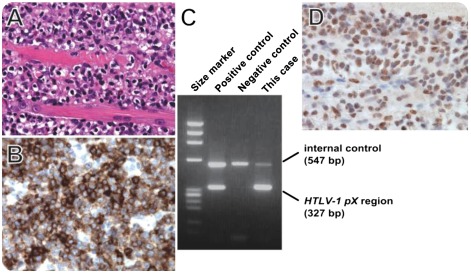
A 64-year-old woman was admitted to the hospital because of systemic body edema and a gait disturbance caused by muscle weakness. At the time of her admission, a complete blood count panel showed a white blood cell level of 10.1 × 109/L (85% neutrophils, 6% lymphocytes, 1.5% monocytes, 7.5% eosinophils) without abnormal lymphocytes, and anemia and thrombocytopenia were absent. Although the lactate dehydrogenase level was normal, the creatine phosphokinase level was elevated to 2546 U/L. A computed tomography scan revealed systemic edema, without lymph node swelling or hepatosplenomegaly. A high short-time inversion recovery signal was observed in almost all muscles on magnetic resonance imaging. In addition, antihuman T-lymphotropic virus type I (HTLV-I) antibody was positive, and soluble interleukin 2 receptor was elevated to 28 300 U/mL. A muscle biopsy of the left biceps brachii showed abnormal lymphocytes invading and destroying the muscle tissue (panel A, hematoxylin and eosin [×400]). Most of these lymphocytes were CD4 and CCR4 positive (panel B, CCR4 staining [×400]), and integrated with the HTLV-I genome (panel C, PCR analysis for HTLV-1 pX region: 1, size marker; 2, positive control; 3, negative control; 4, this patient), and Tax positive (panel D, p40Tax staining [×400]).
This is a rare case of extensive and destructive invasion of adult T-cell leukemia/lymphoma (ATLL) cells into systemic muscular tissues, without the proliferation of ATLL cells in the peripheral blood and lymph nodes.
Footnotes
For additional images, visit the ASH IMAGE BANK, a reference and teaching tool that is continually updated with new atlas and case study images. For more information visit http://imagebank.hematology.org.


